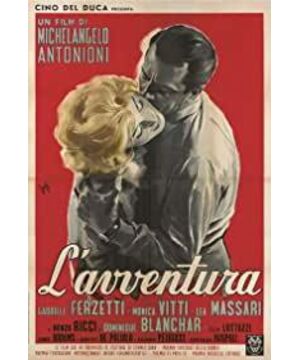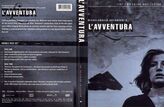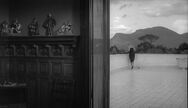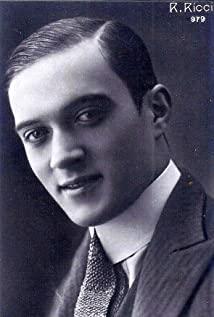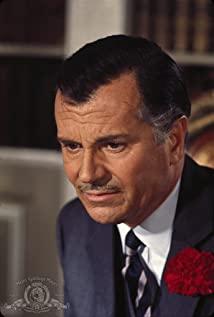In the opening shot of "Adventure", the dark-haired Anna walked straight to the camera, her eyes wandering. Afterwards, the man's voice came out of the screen, and we learned from the cold conversation between the two that Anna had come to say goodbye to her father and was preparing to go on a sea trip. The suspense of the atmosphere was revealed at the end of the conversation: Father thought that "that man" would never marry Anna. When he was about to walk out of the screen, we only noticed the blonde Claudia waiting on the side (in fact, she just passed behind them a few seconds ago). The two women got in the car and left.
Using an absent man and a woman on the fringe, Antonioni almost succeeded in misleading the audience. Until the scene where Anna and Sandro (the "man") linger on the bed, we all want to believe that this is the hero and heroine of the story. Of course we will find that we only guessed half of it correctly, but this revelation was exchanged in a way that offended the tradition of drama.
In the part of sea travel, the whole film was cut into three seemingly heterogeneous faults. It was in this isolated space that Anna evaporated like air and never appeared again until the end of the film. On the huge and silent island, a group of people looked blankly for Anna's whereabouts, while the cameras followed the sights of Claudia and Sandro in turn. In a thrilling overhead shot, a boulder rolls from the island into the sea, like a revelation of some destiny. The fruitless pursuit, the suspended desert island, the brewing storm, and the sudden appearance of the caretaker of the earthen house all create a Hitchcock-like suspense effect. And just like the heroine in "Scary", Anna's role came to an abrupt end, and even her exit was earlier-although few people realized it when this moment came.
But Antonioni is a different director from Hitchcock after all, and he doesn't mind abandoning suspense. So in the second half of the film, when Claudia and Sandro are still looking for Anna’s whereabouts, the romance that broke out between them makes the effort to find Anna seem to be fulfilling some kind of moral obligation, or It was a self-comforting atonement. In the end, the suspense completely faded out of the narrative. We had no way of knowing the ending of Anna. At the same time, we were surprised to find that Claudia and Sandro were not more concerned about this issue than us, and they were enduring each other's inner anxiety at this time.
In Claudia's actor Monica Witty, "Antoniennui" (Antoniennui) has been most accurately personified. Most of the time, Witty's expression is indifferent and hesitant, his eyes always seem to avoid the camera deliberately, wandering lazily between different scenes. Behind the dispirited behavior, Claudia always tried in vain to see everything clearly, so when Sandro asked her to marry her unmistakably, she could only say to herself "Why is it so complicated?" ??” And like many symbolic middle-class male characters, Sandro is handsome and wealthy, and can fall in love with a woman without warning without being tied down by a romantic relationship. This self-consistent moral immunity and instinctive thirst for lust are creating tension with Claudia's inner contradiction, and it is also destined for the beginning and end of this affair.
The title of the film "L'avventura" can also be translated as "adventure". In the natural environment of the island and the social environment of the city, Antonioni set up two adventures that mirror each other: Finding the Missing Anna , And the erotic adventures of Claudia and Sandro. They all found nothing in the end. The island is transformed into a metaphor for society. Tired and bored people float on the ropes of passion, and are crushed by a huge emptiness when they wake up during the day.
When Anna's ghost seemed to have completely dissipated from their world, Claudia and Sandro boarded the roof of the small town church. After a conversation full of misunderstandings and estrangements, Claudia accidentally pulled the bell rope. As the bell rang, she was pleasantly surprised to find that the bell tower in the distance also rang the bell in response. At this moment, the communication has gained the possibility in a realistic sense, but in essence, this kind of communication ironically originated from an unintentional act, a destruction of the actual order, and it is no longer true. As a movie that also explores the spiritual dilemma of modern people, "Qing Yu" is often compared with Fellini's "Sweet Life" in the same period. At the end of Fellini's movie, a weird fish-shaped creature was washed up on the beach, and people who had a night of carnival gathered around to laugh at the ugliness of the strange fish, and the fish would naturally not respond. The absolute silence of Fellini’s object is transformed into a misplaced interaction in Antonioni, but whether it is a strange fish, a bell tower or an isolated island, it is like a sign of the closed inner world of human beings, rejecting everything with their own cold existence. Attempt to communicate. They are like gravel blown into the world by the wind from nowhere, accumulating a desolate and lonely desert of modern spirit.
View more about L'Avventura reviews


